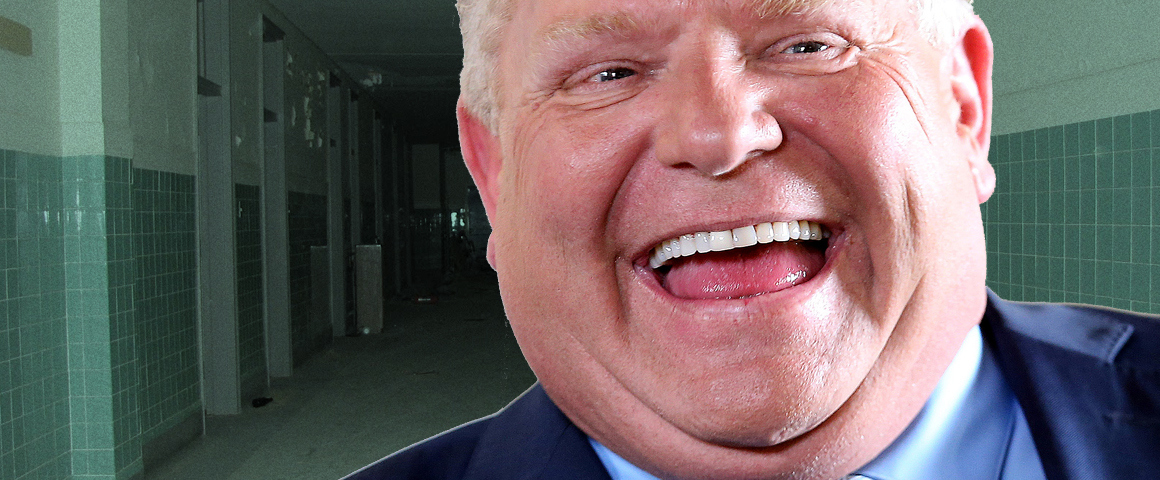When you have an extremely aggressive right-wing government in power, you can not counter it by compromises. Rather, you have to build a fightback to defeat the attacks it imposes on our public health care.
That was the message delivered on Dec. 16 by Natalie Mehra, Executive Director of the Ontario Health Coalition. Speaking to a public meeting organised by the GTA West Club of the Communist Party of Canada, Mehra called the threat posed to health care by Doug Ford’s government the most dire and serious she has seen in her lifetime.
 Referring to the OHC, she said, “We have to build mass actions to stop this government whenever it introduces any cut to our health care, and we will not stop until we stop them. We held a major rally outside the provincial legislature to start with, to mobilize and organize the people to defend our health care, with more than five thousand people (the police estimated 8,000) attending. More bigger actions are planned for the spring.”
Referring to the OHC, she said, “We have to build mass actions to stop this government whenever it introduces any cut to our health care, and we will not stop until we stop them. We held a major rally outside the provincial legislature to start with, to mobilize and organize the people to defend our health care, with more than five thousand people (the police estimated 8,000) attending. More bigger actions are planned for the spring.”
Mehra encouraged more people to join the coalition, urging listeners to reactivate the Brampton Health Coalition to build a fightback against civic healthcare cuts.
She said that over the years, the OHC has often fought and defeated many community hospital and department closures through mass actions. But many urgent issues remain. Hospitals have privatized many services including food and cleaning. Food is prepared hundreds of miles away, and shipped to the hospitals; the food is not healthy or fresh. The coalition opposes private clinics, and raises the demand not only for quality, well funded public health care, but also for universal pharmacare and dental and eye care to serve the people.
Mehra supported the idea that Brampton needs another public hospital. She also stressed the importance of preserving public health care for working families, in these times when income inequalities are so severe, when the rich are getting richer and working families have great difficulties in feeding their families.
 Another prominent speaker, Dr. Hardeep Atwal, former Chief Medical Officer with Punjab Government Health Services, social activist and a former State President of Punjab Government Doctors Association, warned that corporate interests are behind privatizing our health services. Institutions like the World Trade Organisations (WTO) are globally pushing governments to privatize essential services, including health care. When he was a doctor in India, said Atwal, many Canadian patients visited him for medical care, complaining about long waits for treatment in Canada. He was shocked to hear that Canada, an industrialized country, could not provide timely care. He said that Canada is more interested in increasing military spending than in providing quality public health services.
Another prominent speaker, Dr. Hardeep Atwal, former Chief Medical Officer with Punjab Government Health Services, social activist and a former State President of Punjab Government Doctors Association, warned that corporate interests are behind privatizing our health services. Institutions like the World Trade Organisations (WTO) are globally pushing governments to privatize essential services, including health care. When he was a doctor in India, said Atwal, many Canadian patients visited him for medical care, complaining about long waits for treatment in Canada. He was shocked to hear that Canada, an industrialized country, could not provide timely care. He said that Canada is more interested in increasing military spending than in providing quality public health services.
Public health care is in crisis in Canada, Atwal said, due to funding and services cuts. He said that the corporate interests are working hard to privatize our public health care, but the working-class struggle can defeat such moves, by exposing government policies which cause health crises.
Doug Allan, a unionist and a long-time member of the Communist Party of Canada, said that threats posed by monopoly capitalism to our health care are serious. The capitalist class has not been able to eliminate this essential service, thanks to labour’s fight to protect it. But over the years, monopoly capitalism has been able to enter to take over many services. Private financing of hospitals leads to private control of many services like cleaning, food, etc. This has resulted in low quality services, and waste of huge sums of public money. Construction of P3 hospitals has resulted in more than $8 billion being wasted. We have fewer beds in hospitals, staff shortages, and a highly inefficient system.
During a question-and-answer session at the end of the meeting, the speakers answered a wide variety of questions related to health care. They agreed that the Ford government is the biggest threat to Ontario’s public health care, but that we can defeat the government’s attacks by building coalitions in defence of our public health system.




